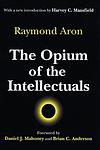Raymond Aron
Raymond Aron (1905–1983) was a renowned French philosopher, sociologist, political scientist, and journalist. He is best known for his contributions to political sociology and the philosophy of history. Aron was a prolific writer on a wide range of subjects, including the philosophy of history, the nature of industrial society, and international relations. His works often reflected a commitment to liberal democracy and a staunch opposition to totalitarianism. Some of his notable books include 'The Opium of the Intellectuals' (1955), 'Peace and War: A Theory of International Relations' (1962), and 'Main Currents in Sociological Thought' (1965). Aron's critical analysis of Marxist theory and his debates with Jean-Paul Sartre are particularly remembered in the intellectual history of the 20th century.
Books
This list of books are ONLY the books that have been ranked on the lists that are aggregated on this site. This is not a comprehensive list of all books by this author.
-
1. The Opium Of The Intellectuals
The book in question is a critical examination of the prevailing political ideologies and intellectual trends of the mid-20th century, particularly focusing on the seductive nature of Marxist thought among European intellectuals. The author argues that these intellectuals often embraced Marxism not for its empirical validity but as a secular religion, an "opium" that provided a comforting sense of certainty and moral superiority. The work challenges the dogmatic adherence to ideological orthodoxy and calls for a more skeptical, empirical approach to social and political analysis, advocating for the values of liberal democracy and the importance of individual freedom over utopian visions.
-
2. Memoirs
The book in question is an intellectual autobiography by a prominent French philosopher and sociologist, chronicling his life from his early years through the tumultuous events of the 20th century. It delves into his experiences during World War II, his observations on the Cold War, and his relationships with other notable intellectuals of his time. The author reflects on his philosophical and political evolution, offering insights into his analytical approach to history, politics, and society. His memoirs serve as a window into the mind of a thinker deeply engaged with the ideological and historical challenges of his era, providing a personal perspective on the broader intellectual currents that shaped the modern world.

